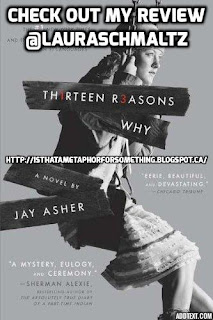I was looking at my bookshelf to see what I should write a review for, and I couldn't believe that I haven't written one for Thirteen Reasons Why by Jay Asher yet. I am often looking for a modern YA book that I can teach in my high school class, and this has been on the top of several suggested lists that I have come across online. While I personally wouldn't feel comfortable teaching this novel, I would definitely encourage teachers to have it on their bookshelves as I think that a lot of students would benefit from reading this novel.
Chances are good that you have heard of Thirteen Reasons Why - Hannah has committed suicide and leaves behind clues for her friend Clay that outline the thirteen reasons that contributed to this. As Clay listens to the clues unfold, the reader learns that we really don't know what kind of footprint we leave on those around us - Clay certainly didn't know how he impacted Hannah's life. As Hannah says, "no one knows for certain how much impact they have on lives of other people. Oftentimes, we have no clue. Yet we push it just the same". When you start to realize this, you rethink how you treat others and what you are putting out into the world. Will others be glad that they have come across me in some way? Or will they be harmed for meeting me?
The reason that I would hesitate to teach the novel is that suicide can be such a devastating topic for so many. I fear that I would not have the knowledge to present the subject matter in a way that would fully respect the wide range of emotions and reactions that students might have. The reason that I think students would like the book, however, is that it gives us insight into the mind of a suicidal teen. When someone is lost to suicide, those who are left behind often feel lost. They wonder why this person thought that suicide was the only way out or what they could have done to help. While Hannah's story is not the story of everyone lost to suicide, it is one story. By hearing, in her own words, what led her to this decision, we can start to understand how mental illness can cloud our judgement and why someone might be led to believe that death is the best answer.
To end, I will quote Jenny Lawson from her blog post "Depression Lies":
Stay real. Stay alive. Stay vigilant against a**holes who make you question yourself. We already get enough of that from the doubting voices in our heads and the lies depression tells us. Listen to my voice, now. You are real. You are worthwhile. You are so important both in ways you will discover, and in ways you'll never see. You send out needed ripples of greatness and kindness in
unexpected and accidental ways.
You won't always see wonderful ways in which you shift the world. They may be invisible to you. But I promise you they are real.

No comments:
Post a Comment